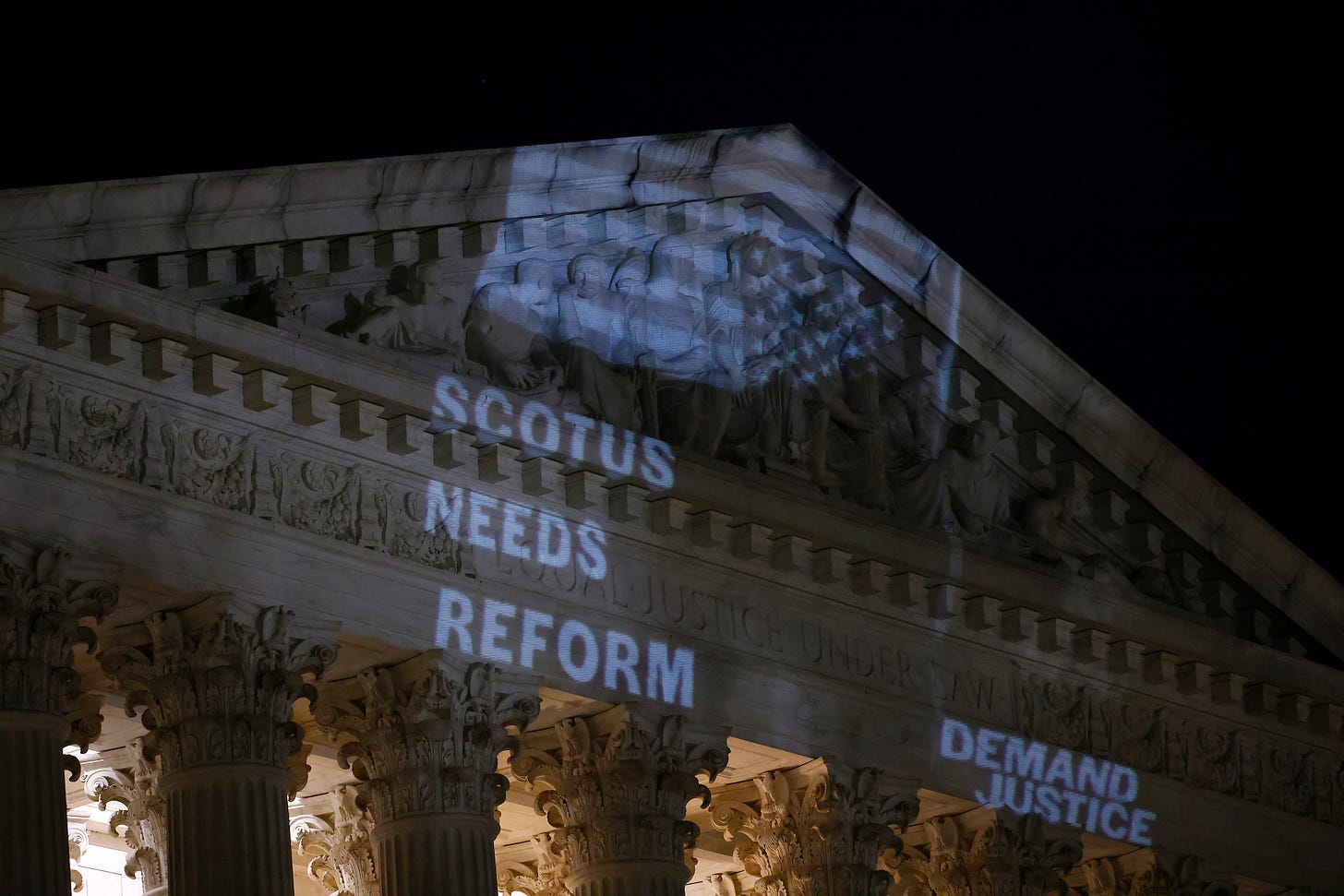Recent Scandals Reveal Weakness of the New SCOTUS Code of Conduct
And the fecklessness of Chief Justice John Roberts’s leadership.

THE RULES DON’T APPLY TO THE SUPREME COURT. That’s the message Justices Clarence Thomas and Samuel Alito have sent with their responses to the cascading scandals impugning their independence, nonpartisanship, and personal integrity. It is also, as a legal matter, true. Justices Thomas and Alito are immune from the restrictions placed on other federal judges to protect the judiciary—the only rules that bind them are ones they wrote for themselves.
In addition to lavish gifts from a politically involved billionaire, some of it unreported, Justice Thomas’s wife had extensive and well-documented involvement in the efforts to overturn the 2020 election and obstruct certification of the electoral vote. Justice Alito has blamed his own wife for the upside-down American flag—a symbol of belief that the 2020 election was stolen—hung outside his home in January 2021. It is unclear whom Alito will now blame for the “Appeal to Heaven” flag, also widely understood to symbolize rejection of the 2020 election result and support for a more Christian American government, flying at his vacation home last summer.
Notwithstanding their clear ethical lapses, both justices continue to sit on cases involving the former president.
In any other federal court in this country, these two justices would be required to recuse themselves from matters involving Donald Trump. The Code of Conduct for United States Judges specifies that any “judge shall disqualify himself or herself in a proceeding in which the judge’s impartiality might reasonably be questioned.” It also sets forth examples warranting recusal because of a spouse’s activity.
The point of this code is to protect the integrity of the judicial process. That’s why it includes as reasons for disqualification not just actual conflicts of interest in which a judge has a personal stake in the case, but perceived conflicts of interest in which a judge might appear to be biased.
Supreme Court justices, however, are exempt from this code.
Last November, after investigative reporting revealed the extent to which the justices have financially benefited from their role, and following relentless criticism, the Court begrudgingly adopted its own code of conduct. All nine of the sitting justices endorsed it.
In a brief paragraph preceding the Supreme Court’s code, the justices say that one of its sources of inspiration is “the code that applies to other members of the federal judiciary.” But the new Supreme Court code differs in significant respects from the code in place for other federal judges. Instead of the mandatory “shall” used in the federal code, the high court’s code merely issues a suggestion: A justice “should” disqualify himself or herself in a proceeding in which his or her impartiality might reasonably be questioned.
The code then weakens the language further by stating that impartiality might only “reasonably be questioned” where an “unbiased and reasonable person who is aware of all relevant circumstances would doubt that the Justice could fairly discharge his or her duties.”
One can only imagine whom the justices had in mind as the unbiased, reasonable, and fully aware person who would be the arbiter of whether disqualification is warranted. (Hint: no one.)
The lack of that arbiter doesn’t matter, because the Supreme Court’s code is completely unenforceable. There is not even a mechanism for filing a complaint. With other significant loopholes that allow these nine justices far more leeway than federal judges, the Supreme Court’s code amounts to little more than a weak effort to silence critics.
The code’s prefatory paragraph states:
The absence of a Code . . . has led in recent years to the misunderstanding that the Justices of this Court . . . regard themselves as unrestricted by any ethics rules. To dispel this misunderstanding, we are issuing this Code, which largely represents a codification of principles that we have long regarded as governing our conduct.
This much is true: The code is, indeed, a codification of how the Court has long governed itself—answerable to no one, without firm limits on behavior, and indifferent to ethical lapses. Chief Justice John Roberts, by continuing to ignore each scandal and refusing to appear before a congressional committee, ensures his legacy as an ineffectual leader whose weak code of conduct will be seen as grossly inadequate and a stain on the Court.





